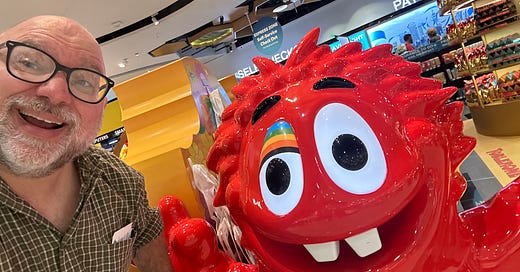Over the last month, I’ve been mostly quiet and just listening to others as things have evolved. The day after inauguration, I left the country for weeks on a research trip (to Australia). At that distance, and being occupied with the rapid collection of data, temporary access to summer, time with collaborators, and awesome fauna and flora, I didn’t positioned to say, well, anything here. With more reflection than I can usually afford, I’ve distilled all of the things that I think might be useful down to four items.
A lot of people are unaware of the jawdroppingly unconstitutional activities associated with the current dismantling of federal agencies.
A lot of folks are, by default, tuned out. Yes, hundreds of thousands of federal employees are fired and the major newspapers and networks couch this as a cost-savings maneuver, rather than the overt steps to undermine cancer research, vaccines, global health initiatives, scientific discovery, and access to clean water. Did you see the huge fraction of people who decided their votes on the day of the election? I don’t know if this is reassuring or terrifying, but I think it’s useful perspective as those of us in academic circles are absoultely heartbroken as the collapse of the basic rule of law within our own government, others aren’t even aware that so many laws are being broken.
While we are afraid for the future of science and higher eduaction, our universities remain anchors of support for people who are even more vulnerable.
Yes, the bad guys are trying their darndest to destroy all of our progress on equity and representation, and yes, many of our leaders are prematurely capitualting to these efforts. It can feel hopeless. On the other hand, think about all of the partners in our community who work with us and our institutions, and all of the families that are sending students to our campuses to learn and to build a better life. All of the people who are showing up to class every day to learn what we have to share with them. Many of these folks are at risk of deportation, state violence, and are experiencing the consequences of economic terrorism quite harshly. Whatever your university leadership is doing or not doing for official DEI programs, we know our priorities and values and we can live them while doing our jobs everyday on campus and beyond.
We should talk about this with our students.
They’re going after universities because knowledge and understanding threatens their power. They’re burning books and working to prevent us about discussing our own histories and the lived realities of people who with whom we share this country. If you have students in a classroom, then I think it’s your civic duty to teach about what’s going on right now as it is relevant to your course material and how the discipline is studies. Share what’s happening with science now. As always, it’s never ever a good idea to tell your students what to think, but it’s always a good idea to share reliable information and provide them with the opportunity to learn and create their own understanding. Yes, you’ve got learning objectives to cover. But as Paulo Friere explained, education (yes, even in the science classroom) is either a tool of oppression or a tool for liberation. Which one is your classroom?
Experience and maintain joy.
Meet my friend, Cookietime. They’re from Aotearoa/New Zealand. We met up in the duty free area at the Auckland airport. Admittedly, it was easier to pursue joy while experiencing the austral summer on a research trip with amazing colleagues. But I’m home now, and am somewhat managing, fully aware that with every aspect of my identity (other than being an NSF-funded scientist and university professor), I’m not the target of the federal crimes happening at the moment. I’m not the best messenger to say, “Try to have a good time while living in a fascist regime!” Regardless, I’ve learned from others that this is a long haul and it’s up to us to sustain ourselves and one another. Most important, know that your work in research, teaching, science communication, whatever else you’re doing is the work that they want to stop, so doing that well is its an important contribution as well.
In the coming weeks, I’ve got lots of great things to share with you about Professor School, top ten natural history moments, thoughts about The Bear and the academic kitchen, the transformative power of peer experiences, critiera in academic hiring, and more. The work continues!




This spring in my Microbiology course, we've talked about information sources. Where does the medical research and clinical diagnostic field turn to? the CDC, FDA, and other federal agencies. It is paramount that these students are aware and proactive about the current situation. This is not a time to blindly turn away from the information. In my classes, we discuss the importance of these working agencies and (hopefully) foster awareness and engagement.